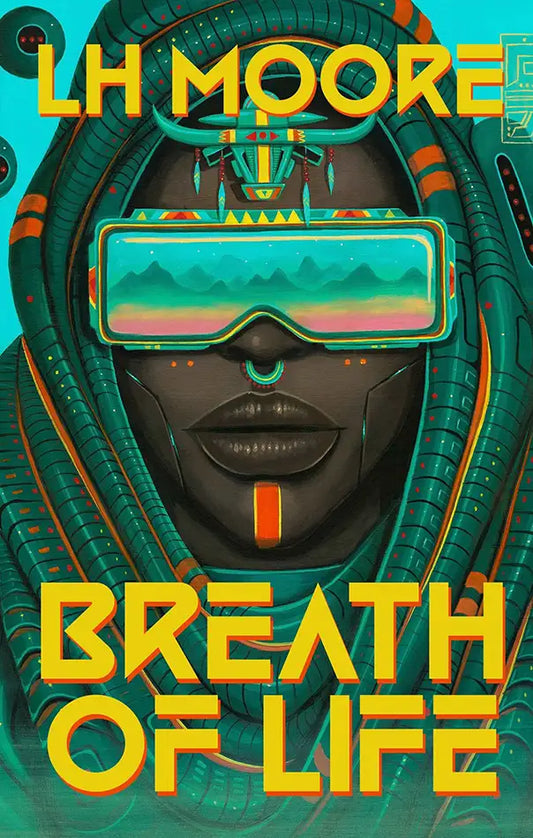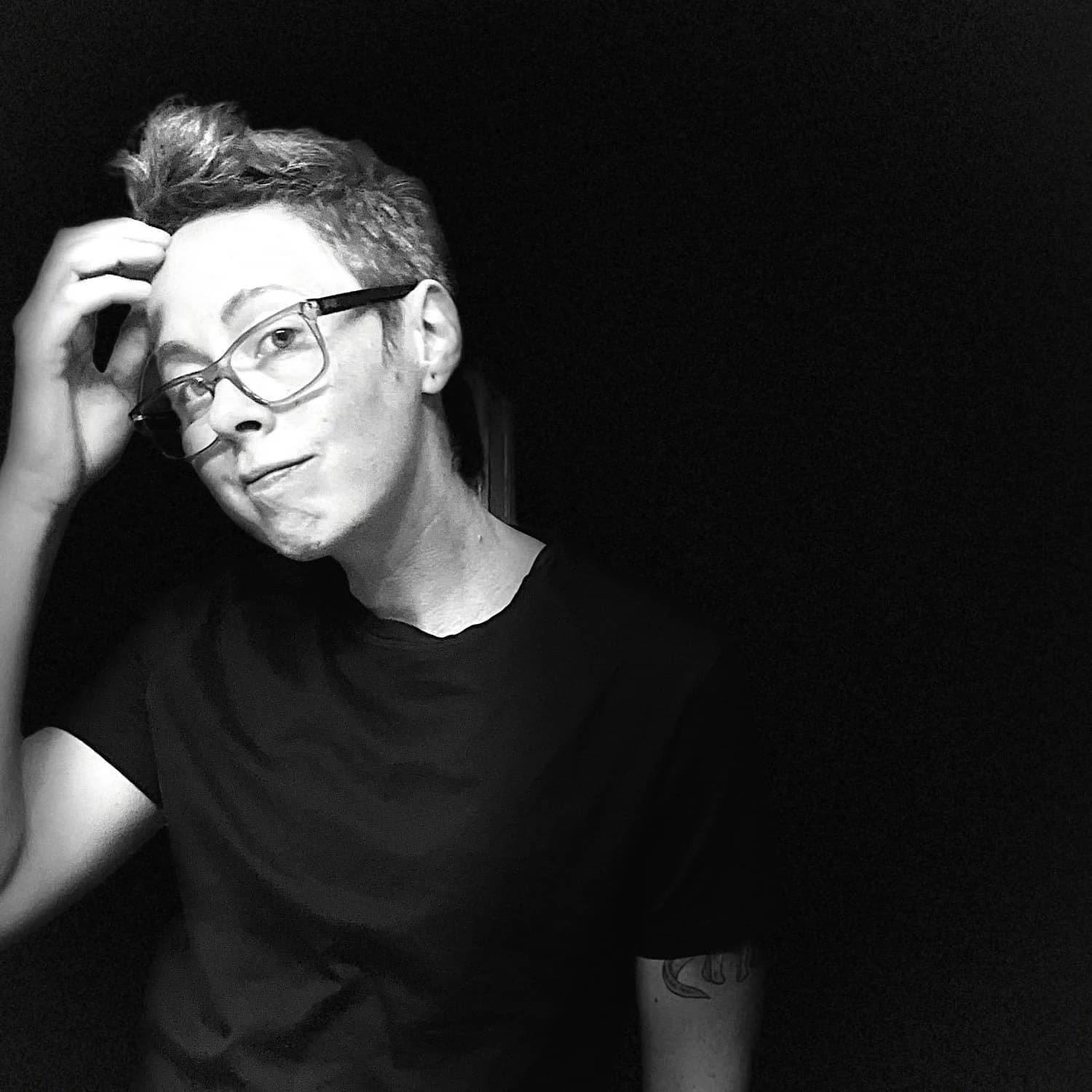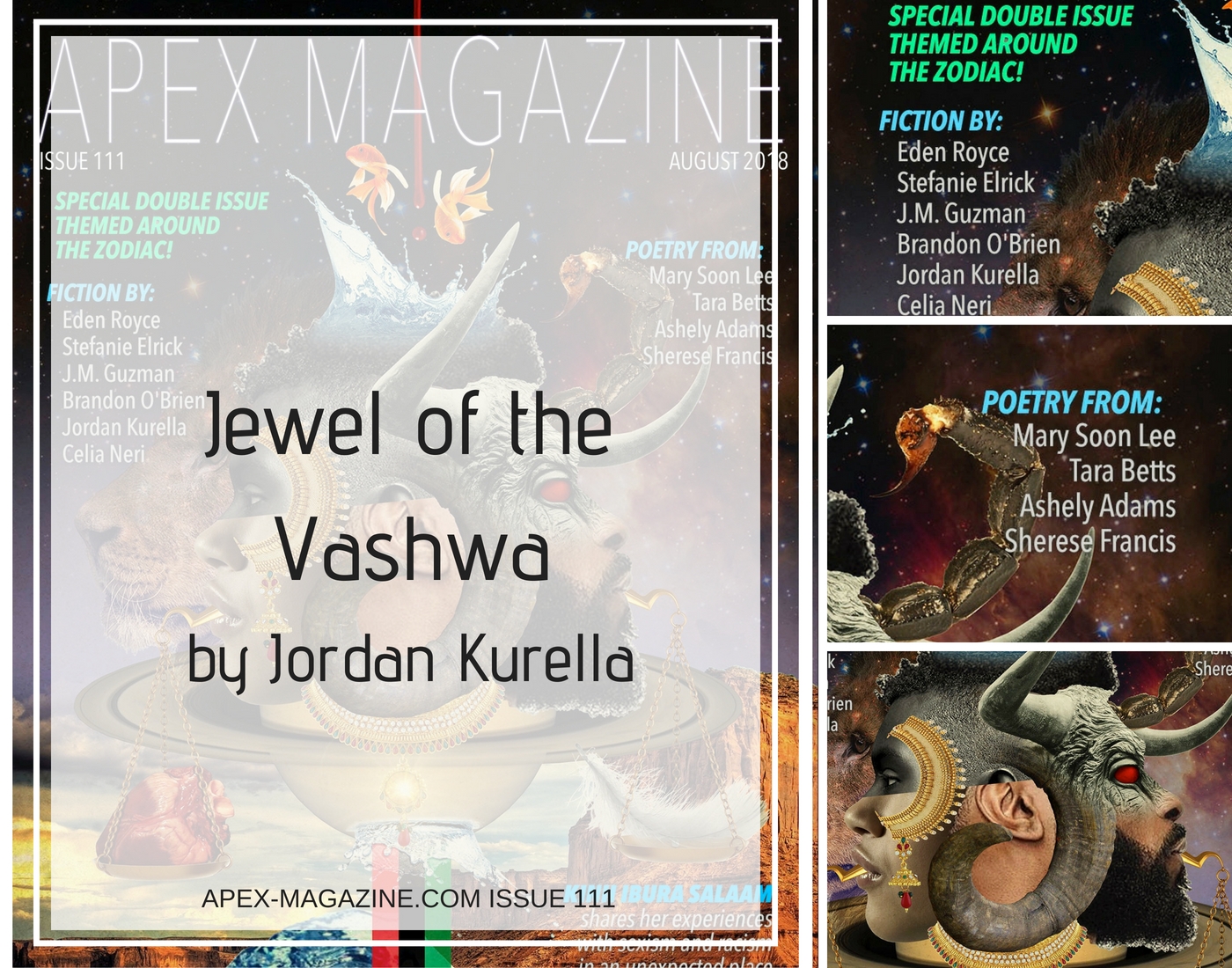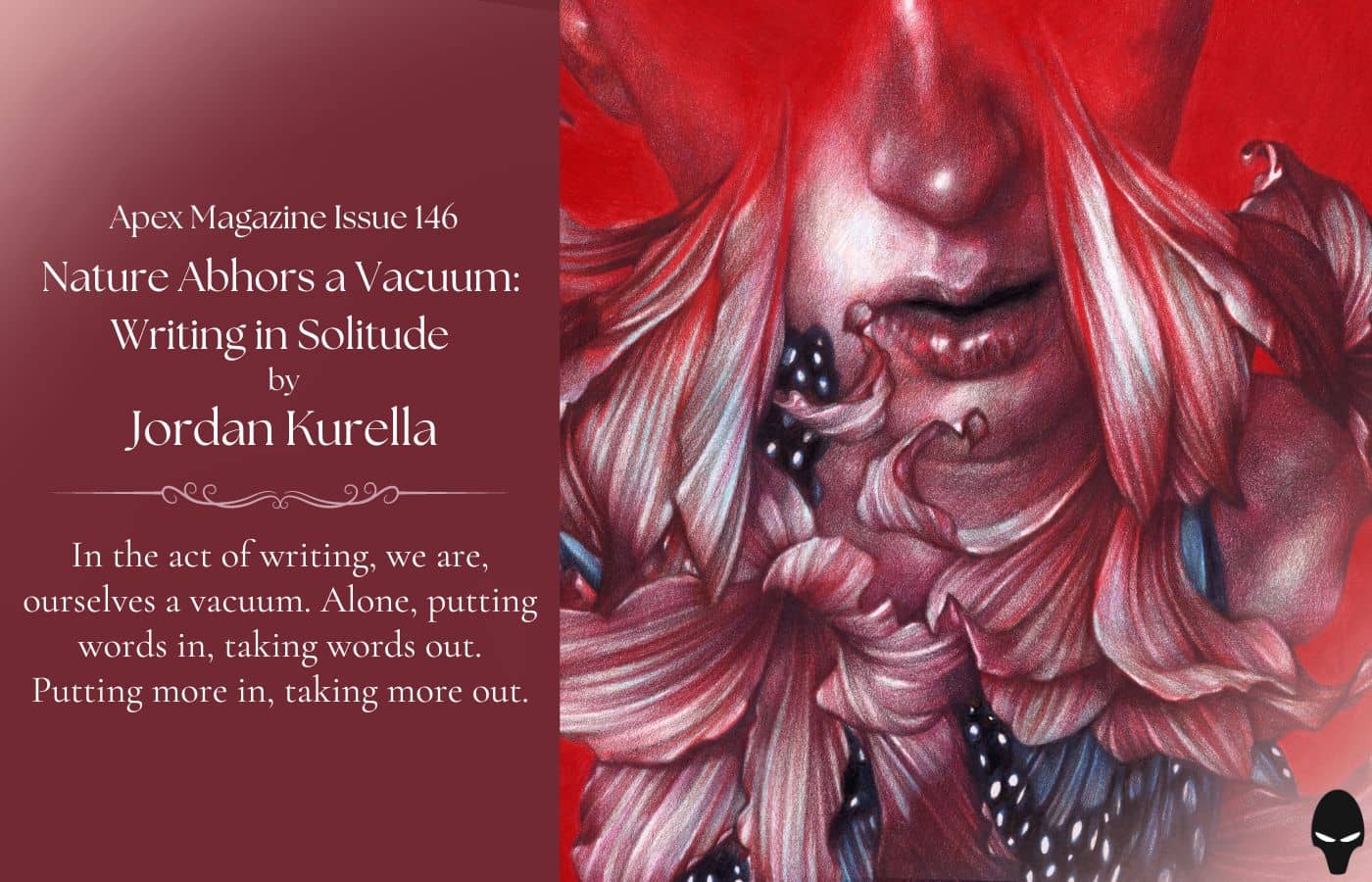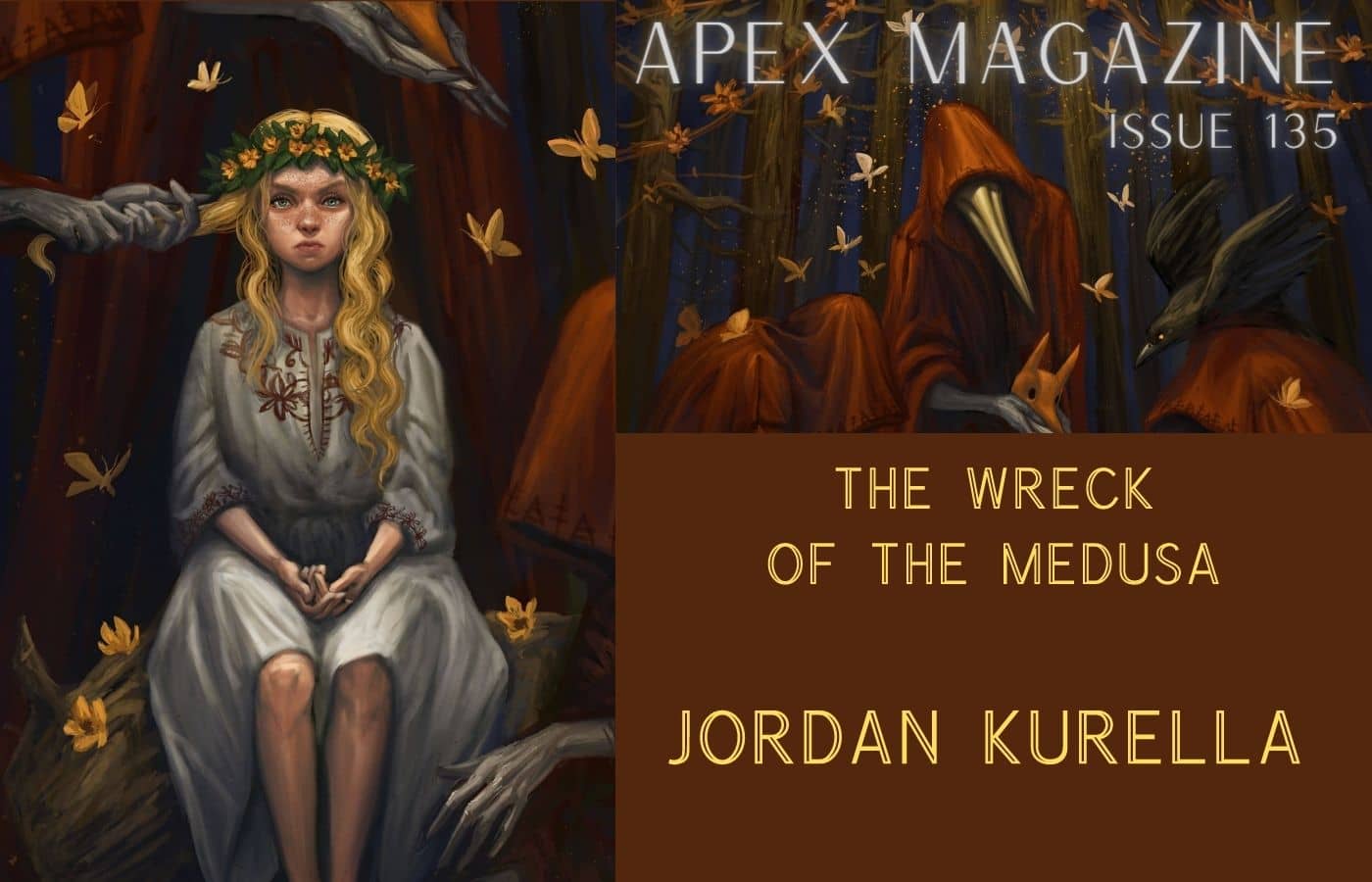
What I saw last night, reflected back from the depths, was not my face. Not the one I see in the grime of The Medusa’s portholes, nor in the glint of a blade before I thrust the knife into my bread (or into another man). What I saw was a creature with eyes as curious as mine, skin with as much sheen, though hers was not from sickness and hunger. Hers was from the depths she lives beneath, and the same harsh conditions she weathers day to day, and night to night.
She had reaching arms, the creature, that broke the sea and curled at the tips, over and over upon each other, like vines. The night steals all colors but shadow; she might have been Kraken red, or something else just as murderous. But what I knew of her was her eyes, and her gentleness. And that she held nothing but love for me. Somehow, I knew it in the way she looked at me with an unblinking gaze as she descended back beneath the crest of The Medusa’s wake, and I heard her say, in that forgotten part of my mind:
You avoid the truth of who you are, but it will find you, in the end
Sailors are taught to swim out of necessity. Pirates must fight to swim, so that they can survive. I fought to be a man the same way: so that I could survive. There was no way to do so as a woman; the very idea, the very concept and trimmings of being woman, suffocated me. My parents understood. They always understood. When I came of age—when I first bled—my mother cut the waves of my black hair as short as she could. She dressed me in my father’s old pants and shirts, which she tailored to fit my shorter, newly curving frame. Then, my father set me to work on the house with hammer, nail, and a fistful of curses.
He helped me build my story as we nailed shingles to the roof and dug the loo. He helped me become Jack Tender: a trader and a pirate. A carpenter’s son, he decided, orphaned, lost, and in desperate need of work, and willing to do anything to get it. A man of wanderlust looking for adventure. Not tethered to the land as the son of my parents, not tethered to running, like them, from England and her lovers both.
The night my father saw the King’s sailors staggering out of the pubs in Port Royal, he gave me my things and said, “There is no glory in stealing for King and Kingdom. There is only glory in stealing from them.”
She surfaced again last night, the creature, to say more riddles. There is no malice in the way she speaks, as if she either cannot feel it, or is capable only of malice within the grip of her tendrils, or between her rows of teeth. Malice for her is an action: intended for those who intend it toward her.
Once again, her arms crested the water as the night helmsman was occupied with his sextant and his stars. Once again, she and I kept our counsel while Orwen kept his: fast asleep from drink, the deck rumbling from his snores. We spoke while Captain Boor kept his counsel entertained, their cries like sirens into the night. In the din of all this, the creature spoke to me.
And she said:
You do not fear death; you fear to offer life what it needs to keep living
I reached out for her then, but she slipped below the water’s edge before I could touch her. That morning, I slept not at all. Insomnia took me: I tried to read and came up empty, tried to drink but wanted none of it. My mind turned over the concept of fear for hours. I have done all that I can, all that I could: pleasing Captain Boor, serving the night helmsman’s every barked order, befriending the angering crew, leaving behind my father, becoming his son and my mother’s only boy.
Orwen still finds the strength to sing, though we are down to slivers of bread and inches of broth. We’ve seen neither a ship nor a storm for weeks upon weeks. He seems less bothered than most, singing every night as he cleans the muskets and the deck. And I hum along with him as I check the ship to find it crawling with disrepair and too many weeks at sea and sun.
We’ve all slimmed with lack of food, and our tempers have grown thin as well, yet Orwen’s belly still swings low with each of his breaths, his voice clarion across the night. He makes up in melody for what he lacks in teeth and hair, and his sunburnt face has scarred in all the wrong places.
He remains familiar as the crew grows unfamiliar, growing agitated under alien stars.
The night helmsman guides them all, likely once again toward mutiny. He has a full face of teeth, which remain fast in his face, stuck there from stubbornness and fury. He uses them to great effect to snap at anyone who refutes him. His face has thinned to a gaunt and grotesque figure, and his nose has sunburnt so many times to have blistered to a fine point.
He says little else aside from insult; he is a man with no room for kindness. Spitting hate through his perfect teeth each night as he fails once again to match map and sextant to the foreign stars we sail under, trying to plot a better course than the one we are cursed upon. The night helmsman and Captain Boor argue every morning, and every morning, they come to an accord. Yet still, every night, the same unfamiliar stars appear. Before we sleep after sunrise, Orwen and I grin and chant the night helmsman’s curse as a prayer before our nightmares.
“Bastard son of a piece of shit. Bastard son of a piece of shit.
We’re all bastard sons of piece of shit on this barnacle-spun, pieced-up ship.”
In truth, I have taken pieces of both men: Orwen and the night helmsman. Borrowed aspects of what I’ve observed. Orwen’s capacity to weather any storm and face the calmness of our curse. The night helmsman’s determination to see the impossible through, no matter how futile, no matter how much it might ruin him.
As I learn to become a man, a pirate, Jack Tender—as I unlearn being my father’s son, my mother’s only boy—I take pieces of men to my chest and wrap them around me to make me stronger, more able, more capable. Yet these men never question who I am. They know.
“Jack,” Captain Boor says to my ear every morning, whispering in adoration.
“Jackie, hey, c’mere, lookie,” Orwen says, pointing over the rail at yet another shark.
“Jack, you absolute fool of a boy,” the night helmsman says. “Get away from there.”
To them I am Jack. Yet to me, I am? What?
Captains come and go, and we’ve had five in my time aboard The Medusa. Coming and going, some die, some are killed. Captain Boor was doomed the moment he took the title, but he knows that. His first action was to sail the ship into these cursed waters, and he spits on every day that he led the mutiny to kill the captain before him. His saving grace is that he is a lucky man, though hated by the crew. He tells me, over our morning tea, that his objective in the little time we have left is to make me happy.
He succeeds, at least, at that.
We’ve not seen shore in weeks, and my legs don’t know the cant of it anymore. Captain Boor is as furious at the night helmsman when he looks over his own maps and sextants. He watches the night helmsman leave, the latter proud and tall, keeping his own counsel of lies. It is my duty to arrive when summoned, to kiss the Captain to distract him from his despair. From our despair. It is his duty to kiss me back, and then, when we are finished and sweating, I read to him from my book.
He likes my voice, and I like his tongue.
This morning, however, there is no reading. He instead walks to his desk, littered with maps and notes and measuring instruments. The light filters through the smoke and the haze and lights up his back: muscled and scarred, from the ripples of his shoulders to the sheen of sweat on his legs. I sigh, but he turns, disturbed.
He asks, “Jack, you’re from Port Royal, yes?”
“Sir, yes, I am, sir.”
“Right, ah—whereabouts are we then, in this shit?”
He calls me to him, turning around to show me where we are on a map, where we’ve traveled, and where home should be. Where other ships should be traveling on their trade routes. Where we are meant to be. And we are meant to have run aground of Port Royal days ago—according to his measurements. By now, we should have sailed over the entire island, and beyond and beyond.
And yet, no. No shore in sight. Not even the cry of a bird.
Boor looks at me. He knows that I know this: where we should be, where we are. It is easy; one can tell by the absence of familiar stars and the creatures that favor them. I rest my hand on his shoulder. He pours a drink to drown himself in. There is only one way for a man like Boor to admit he is wrong, and that is through silence, stoicism, and to drink himself to the dark below.
Through my life of collecting pieces of men, I once tried them on like costumes, practiced them like songs. Now, however, it’s no longer theatre; I am no longer performing. I collect my pieces of men like I’m teaching myself to swim: it is a need to survive.
I stole my father’s way of speaking: he loved the stage, and to sing. So, too, do I. In this way I have my voice. As for Orwen, I have stolen his walk: so cocksure and steady upon the boat. Never once falling, even when half through a bottle and on two days of nightmares. Of Captain Boor’s personality, I have taken his inquisitiveness, his want to discover, to understand.
His admission that he is often wrong, but the steely gaze upon his face when he knows the opposite is true. It is this look I give the night helmsman the next evening when he has Captain Boor at the edge of his knife and the rest of the crew calling for “Bread or his head! Bread or his head!”
Orwen glances at me as he, too, is chanting.
I steel my gaze as stoic, too, as I have learned from the captain. As I know what he’s done, I know his mistakes, which are one. He is simply a man, drunk on his own hubris and glory. A man who thought he could do something impossible, as men tend to assume. He did not listen when I cautioned him, he did not listen when I spoke of the cursed waters, of the calm seas, of stars known to no one.
The night helmsman agreed with Boor, told him that our food would not last the way around. He told the captain that my tales were superstitions and fairy stories. They pushed the maps aside, planned their course as I shrunk back to the bed and sat down.
It is not Captain Boor’s doing. It is man’s own.
Once, as a man in my parents’ home, my father told me a secret. He said that there is no wrongness in what a man offers, only in what parts of himself he kills. That what he offers should be done with neither fear nor hesitation. That all that needs be done in this cursed world is done out of kindness.
He said that with every part of himself he kills, a man brings ruin to his kin.
It is this that I remember as the night helmsman turns his eye on me, as I stand with borrowed stoicism on the deck, as he and his knife stand a breath away from the Captain. There is a pause where no one speaks, where no one turns, where the seas are calm and no birds dare trespass. The scrape of the night helmsman’s knife shaving Boor’s neck makes me grate my teeth.
The night helmsman turns to me, grinning with his full set of teeth, with every bit of ire and malice he ever had. When he speaks, it is with not a word of calm; he only wishes to incite, to take us all down with him.
He kills the part of him that could end all of this.
He says, “You want to end up like him, Jackie boy? Dead and bleeding and feeding the sharks?” He grins. “Maybe we’ll cut your throat too, and pass your bits about and feed like sharks ourselves, eh?”
The chant dies then. Orwen’s fists fall to his sides, and he brings out a knife. Others bring out their own weapons as I stand as a patchwork of myself: no need for weapons, for I am my own, made of pieces of men. As such, I avoid the night helmsman’s gaze. Instead, I stitch myself together, all my borrowed pieces. My hands remain calm, my shoulders square.
There is no fear in what a man can offer.
And to this mutiny I bring—
The first night that Captain Boor sailed into this inescapable triangle of the Caribbean, the creature surfaced. She crested the water’s edge for the first time. When we first crossed into these cursed waters, I knew what she was from stories and tales and horror in the eyes of men who’d seen such terrors. However, she was unlike any story or song. She did not mean to destroy—at least, not me.
When her head surfaced and we saw one another, I was afraid. My nails bit my palms, my teeth drew blood from my lip. My body shook, but there was a calm when her voice washed over me like memory, and she said:
You must look back into who you were to leave where you are
That morning, I had read again from the book my father gave me before he sent me to my first captain of The Medusa. There is a passage where the hero knows what he does is futile, and yet he does it anyway, for the sense of adventure and the sense of discovery of who or what sort of man he is. The book speaks not only of the nature of truth, or of man, but also often of how no one, except Don Quixote himself, understands the nature of adventure.
And if the nature of truth is to crest the surface of the water, always and forever, then it may be my salvation—our salvation—in what the creature does and has done. Which is to guide me to where I am. To where I need to be.
In this end, the creature guides my hand in this mutiny, here and now. With it, I part the crowd. As I do, the chant resumes, this time for the night helmsman’s head. The night helmsman who spits venom and vitriol in harmonies toward me and to the captain. The captain, who is still tied to the mast and wide eyed at the changing spectacle.
My hand is raised in a gesture of peace and calm. I wish only to speak to the night helmsman, to tell him the truth in what occurs here, in what has occurred here. The crowd’s song comes in like waves: the melody rhythmic, in and out, in and out. A din I neither know the words for, nor do I understand.
Captain Boor looks to me. He smiles, yet I have no smiles for him.
I place a hand on the night helmsman’s shoulder, and he turns to me, gaze full of hate. He too has a knife, and it is raised high and murderous. My face is reflected in the blade, and it is calm. It is the face of my father, and my mother. Brown skinned and black haired. I do have a smile for him.
Here is where the first shot rings out.
Bodies hit the deck, the report echoes in the chaos, the chant begins again. Their singing is louder now, some of the songs for Captain Boor, demanding his sacrifice. Others for the night helmsman, demanding his. In this concert, my hand is still raised, my face reflected in the knife is now a blur. The night helmsman’s posture of stoic calm is now unnerved, his hand shaking, his teeth gritted against what he wants to do, yet cannot. The captain remains calm as a man who knows two things: he is finished, and he is captain no more.
His time, such as it was, is over.
The next shot rings out, and the next. The night helmsman falls back, bringing his knife with him, and I follow. The creature guiding my every movement. In these moments, I have neither fear nor trepidation. I remain embodied of peace, of calm. The night helmsman swings at me, and I brush him away. I brush all of this away: this. The screams, the chanting, the violence, the mutiny, all of it. And in so doing, it begins to rain.
The rain is a dousing thing, and the boat rocks on waves not felt in weeks, in months. Time has been uncounted in these waters, as the moon hung half-waned and unmoving in the sky, as our boat hung half-mast and unmoving in the sea. We do not know how long we remained moored in this mêlée; I know only that in the violence of the waves, I am thrown from my feet and into the mast.
My legs do not understand the cant of storm anymore.
Another shot rings out, the last in the rains. The sound of storm has overcome the chant, the screams, and the gunpowder. Yet I hear it, and the lead lands in my hand: deep and red and furious. I see it, but feel no pain, not yet. In the shock of the moment—the mutiny, the creature’s guidance, the gunshot—is when the night helmsman strikes. He throws me to the deck, holding my face to the water which pools in the rotten boards. He would drown me, if he could. A not impossible task.
I sputter for breath, trying to fight him off. He is thin and wiry but has the full strength of hate. Shock has me bolstered, and I manage survive on that alone, until Orwen. He arrives, and the two fight with sharp words destroyed by the storm.
I lift my face from the deck, coughing and choking, to find Boor kneeling beside me, his smile sad and doused with worry. “There is not much time, Jack,” he says, reaching his hand to me. “There is not much time.” I take his assistance; I am glad of it. The creature speaks to me then, for the first time in this melee. Her voice is kind as she is kind, yet she sounds worried as she guides me to my feet. And this is what she says:
There is no time
My father told me, when I was becoming a man, that the truth of me was always evident, even when I wore my hair long and ran about in dresses. That there was no hiding who I was from him. That he always knew I was his son. My mother knew too, always trying to dress me in pants or in sturdier shoes to climb the mahogany trees higher and higher. She would laugh as I would out climb my ambition. And would become stuck, too high in the tree, and could not come down.
It would be nightfall before Father could come and rescue me.
It is with that same thrill of climbing the mahogany trees that I witness the shaking deck of The Medusa. Like the trees at home, I had out-climbed my ambition, and succeeded. For now. And for now, I live. I live to feel our ship rocking on violent waves of storm after so, so many weeks of calm seas. The air is full of brine and with the screams of men.
Orwen claps his hand around mine and says, “Can you walk, Jackie?”
I can, and do, as the crew climbs and brings in the rigging for the storm. I am unable to assist in the chaos, as I am shot, and badly. Orwen helps me to walk to the captain’s cabin where he lays me down and fawns over me in his way until the surgeon arrives with needle, thread, spoon, and far too much rum to be natural.
In my haze of in and out as the surgeon fishes out the lead and stitches me up, I hear Boor and Orwen talking.
“The ship won’t make it—”
“Aye, but maybe we will—”
“How do you—”
“Ship’s cursed we—”
They speak loudly over the crash of the waves and my screams. The surgeon says I scream like a woman. Boor and Orwen smile and go back to their loud discussion as the ship rocks and the surgeon spits on his needle once more.
And once more again. After that time, I fall into fever.
In this fever, I slide into deep water and am held by her arms. Her arms, the creature’s. She takes me, curling in those vines, and lifts me above the crest of the waves to show me The Medusa, or what is left of it: a raft of four men attempting to salvage one another and what they can so that they may survive this horrid landscape.
Upon the raft I lay, struggling and feverish, fighting for my life. I am being tended to, given water to drink, having my dressings changed. Being fed as much as I can take. I—turn my head away and spit so often over the side. My brown skin now pale and sallow. I am sick, or I am dying. But yet, the creature says:
The captain is dead; you are the captain now
The raft is real and smells of offal and sick. It was not a figment of feverish dream, as I had thought. I do not know how many days have passed; I may never know. My body aches, as it would from days of fever. But Orwen tells me I was a hero, and tells me I have been leading in brief moments of lucidity between fevered nightmares.
He tells of how I thrust all to lifeboats, salvaging what I could in a fury he had not seen in any man before. He tells of how Boor pushed me to the lifeboat so that I might survive. He tells of how I protested, and how Boor kissed me one last time. He tells of how three of the lifeboats did not survive in the storm, nor did many of the men. What did survive are the planks we sail on: planks splintered from the sun, men rotten from lack of food, from overdrink.
First there were eight. Then six. Now there are four.
We’ve only hours of water left, and the men are growing sick from drinking sea water and their own piss. The night helmsman watches me with an ire I recognize. He saved the same for Captain Boor, and the captains before him. My mother once said that some people are born with hate tattooed on their heart. I am the captain of the dead and dying, and my mother’s voice echoes in my head as I wash in and out of fever.
She says, “Jack, let you always see hope.”
The creature came to me last night when the rest were sleeping, and I felt her watching me: concerned, curious, wondering if I would yet live. Reaching out with trembling fingers, my hand brushed her arm. It was slick, so strong. There was power within her, and I breathed it in. Her gaze was kind upon my withering body.
“There is no time,” I said to her.
My voice sounded wrong to me, like the scrape of sick on sick. I coughed, and the raft stirred. The surgeon coughed; Orwen coughed. I spoke again, “There is no time.”
She pushed her arm against my hand, and her eyes were kind in what was left of the moon. We were under stars I recognized; we were in the early autumn. There was a tide, and it was moving quickly toward something. Something I knew was shore.
As she pressed her arm to my hand, she said:
It is you who must guide you home
My fever breaks, and it is hardly light. There is a retching sound as the raft is nearly submerged. It is not my own, the sound. The sun is setting and the tide is rising, and the night helmsman has his knife to the surgeon. The surgeon is pleading to live, but it comes out in coughs and spurts; he cannot speak, lest his throat be cut. The point of Orwen’s knife is held to the night helmsman’s pointed nose.
They are not yet at the killing stage, but the killing is not far off.
“Gimme that knife, hey. No need to be hasty now,” Orwen says.
The night helmsman is a man who cannot change. With the ebbs and flows of time, he is stone. An admirable quality for something so easily sunken. And he says:
“You’re a coward like all the rest of them. Useless, wretched, and lazy. Too afraid to gut him, cut him to pieces, and eat him. Too afraid to survive. Less you want to die too, you’re gonna put down that knife. Cause I’m the only one of us left on this sunken failure who can get us anywhere, you useless piece of man.”
He continues to speak as I crawl forward on silent limbs. Orwen turns, and his knife shakes against the night helmsman’s nose, his mouth trembles in fear. Yet I say nothing as the surgeon continues to cough his pleas to live. He will not have to do so for long. No one will have to suffer on this raft for long. Except one.
And that one turns, and I begin.
With one arm of mine, smooth and strong as hers, I reach out and take the night helmsman by the waist. I wrap it around and around and around him, silencing his breath. He can no longer breathe his hate. His bellows has gone out. The other arm reaches and covers his vile mouth: the one that had no kindness for me, for Orwen, for any of us. That spoke no truth. That had nothing but want to destroy any man but himself.
What I do next may be futile, but I must do it to understand the man that I am.
So, with arms Kraken red and shining with the power of the sea, I drown the night helmsman. I drown him shallow. Shallow so that the gulls flying in may have him. So that they may feast and guide us home. They arrive in a squabble so thick that they black out the water and the sky. They take pieces of the night helmsman, my offering: they take from his hand, his arm, his leg, which they fight over as it floats toward shore on the rising tide. The horizon looms, large and mountainous, blocking out the litany of familiar autumn stars. Night steals all colors but shadow, and it is as dark and welcoming as her. It is me who guides us home, with my offerings to shore, and my pieces of men.


